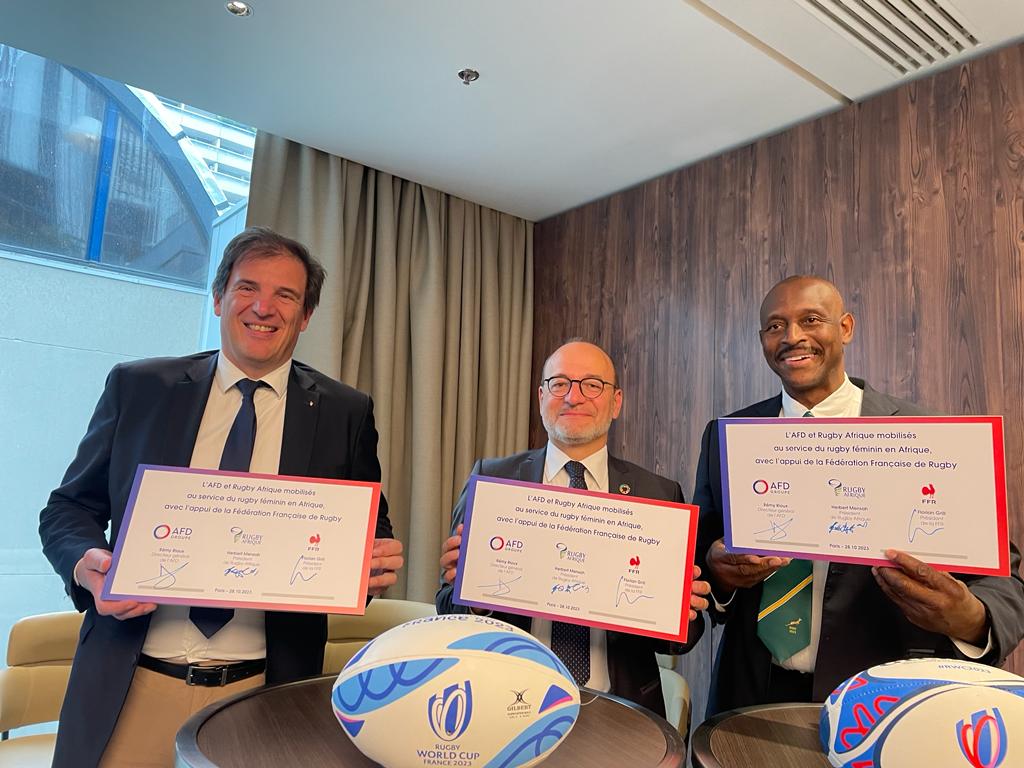On the final of the Rugby World Cup France 2023, the French Development Agency (AFD) and Rugby Africa, with the support of the French Rugby Federation (FFR), are operationalizing their partnership through the implementation of an ambitious program to develop women’s rugby in Africa.
The partnership between AFD and Rugby Africa, signed on July 10, 2022, reaches a new milestone with the signing of a €500,000 financing agreement for the implementation of a program aimed at strengthening the inclusive practice of rugby in Africa.
The project aims to strengthen the skills of African rugby unions to develop women’s rugby and promote social cohesion through rugby. The FFR will also leverage its expertise in training leaders, coaches, and referees with the 9 African federations in the program (Benin, Burkina Faso, Côte d’Ivoire, Kenya, Madagascar, Uganda, Senegal, Togo and Tunisia).
At the same time, the programme dubbed get into rugby a module recognized by the international organization World Rugby – to discover the practice of rugby will be organized over a day in communities in order to transmit the values of rugby, raise awareness and deconstruct the gender stereotypes to more than 10,000 children.
The first two training courses, which took place respectively in Madagascar (from June 10 to 20, 2023), then in Côte d’Ivoire (from August 21 to 31, 2023) were a great success. In Madagascar, no less than 600 children were brought together for this occasion! Vanessa Doucelin, Deputy Director of the Côte d’Ivoire agency, shares her enthusiasm: “I am convinced that this project will continue the energy and legacy of the Rugby World Cup France 2023, and that it constitutes an opportunity to share our vision of a common world.”
A true catalyst for social change, the oval ball embodies the impact of sport which improves the prospects of young people around the world. Thanks to this initiative, rugby, through its values, exerts a significant influence beyond the pitch and becomes an accelerator of development in Africa.
Hebert Mensah, President of Rugby Africa underlined the araes that thge partnership is likely to adress: ”The partnership between Rugby Africa (RA), the Agence Française de Développement (AFD), and the France Rugby (FFR) aims to address gender inequality within rugby and empower rugby unions across the African continent. By leveraging rugby’s core values of teamwork, respect, and discipline, the collaboration seeks to promote gender equality in the sport, fostering opportunities for women’s participation and leadership within rugby organizations. Additionally, this partnership contributes to strengthening rugby across Africa, ultimately enhancing the region’s competitiveness and, in the spirit of rugby, celebrating the sport’s unifying power, exemplified by the historic win of the Springboks and their fourth championship title”.
Rémy Rioux, Directeur Général de l’AFD praised the initiative saying: ”In the legacy of the Rugby World Cup France 2023, Rugby Afrique and AFD are mobilized to promote women’s rugby in Africa with the support of the French Rugby Federation. We share the conviction that sport is a tremendous accelerator of sustainable development. With the spread of the practice and values of fraternity and inclusion inherent to rugby, this project contributes to the reduction of gender inequalities”.
Florian Grill, President of France Rugby remarked:” Rugby was born in schools: it was invented for its ability to transform individuals. Rugby can empower and shape communities. The respect, solidarity, loyalty, and sense of celebration it embodies are universal values, essential for living well together. Aware that the practice of rugby is still too limited to certain territories, the FFR is delighted to support the AFD and Rugby Africa in their efforts to promote rugby and its values on the African continent, which will comprise 40% of the world’s population by 2050.





